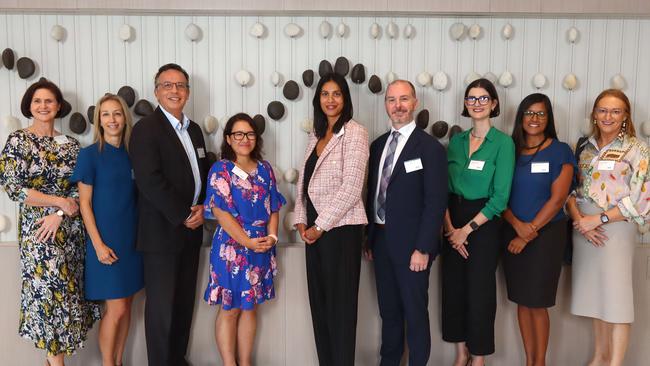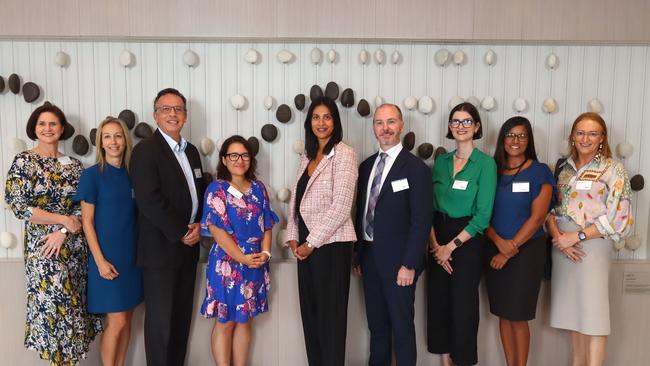Future of AI still needs human workforce
Digitisation, automation and AI are reshaping all parts of the economy but a human labour force is still essential, according to experts at a recent BDO/Courier Mail boardroom lunch.

QBW
Don't miss out on the headlines from QBW. Followed categories will be added to My News.
Industry leaders say a human labour force will still be needed for the future workforce despite the trend towards automation and artificial intelligence (AI).
The outlook comes from a discussion on the impact digitisation, job automation and rapid AI developments will have on future work, at a lunch hosted by BDO and The Courier-Mail last Thursday.
A global survey conducted by the University of Queensland found while two-thirds of people felt optimistic about the benefits AI can bring to society, 42 per cent believe that AI will replace jobs in their area of work.
“The change the technology revolution provides is really exciting, but there will be people within the community (and) our organisations that are threatened by the potential negative connotations of that,” Aeris Resources chief people officer Kim Franks said.
“One of our execs said we won’t even need HR, we’ll be able to just ask it (AI) to write a policy.
“But you’ll always still need that human experience, the expertise and capability overlay.”
BDO director and digital and technology advisor Kane Stavens agreed, saying it will be a while before we see and trust AI to work in this way.
“AI is not ready to make its own informed decisions,” he said.
“You still need humans to sit there and design the business rules to say we’ve got all this data, if we use it this way and present it to this person they’ll be efficient, AI can’t do that yet (and) I think we’re a bit away from that.”

Certain trades will become more prominent with AI and automation expanding and creating new roles.
Data3 Qld general manager Ray Merlano said this is “becoming mainstream” among businesses, and unfortunately has already seen job losses.
“A number of the bigger, global players are focused on additional jobs to a larger amount around AI and machine learning,” he said.
“They’re going to be investing in these growth areas to develop their business.”
Strategic and Commercial Outcomes managing director Lindi Deguara said it’ll come down to purpose.
“There are some people whose job will be lessened or their jobs will go (and) for those people, employers need to be looking at what else can I get this person to do because we will always need people.
“People have to be a little repurposed - it’s a shift as opposed to things (jobs) being eradicated.”
Thiess chief people officer Julia Horton said this will require a “mindset change” around how traditional jobs can be performed in the future with AI and automation.
“If someone was a good truck driver they may (be) a good remote control person because it’s different capabilities,” she said.
“(It’s) right back to labour strategy and workforce planning - it’s understanding what the capabilities are.”
Bluebird Leadership founder and director Cherry Ward said “reskilling” and upskilling the workforce can help people develop the capabilities that translate to a job of tomorrow.
However, this change has been met with some resistance within the current labour force.
“When I was at BHP we introduced the automated vehicles and that was a massive change process,” Ms Franks said.
“The unions had a lot of pushback around the retraining and skills training process and it did do away with a certain role - truck operators were no longer required.
“There (was) a skills shift, you don’t need that particular role but it provides different opportunities for people who are willing to.”
“BHP can afford the scalability of introducing a technology like that.”
“Smaller mining operations don’t have that capital to throw at new technology - it’s just not that accessible.”
With the digital future wave already underway, the benefits it is and will bring to the future of work was also noted.
The discussion acknowledged how younger generations are already growing up accustomed to technology, making it a possibly easier transition into the future job market.
“If I think of the younger cohorts in my environment, and if they were present in this conversation, they would say AI is about inclusion and there’s a really positive feeling around it (and) the things that it provides,” Robert Walters associate director Mary Darke said.
Other jobs with routine tasks can be outsourced to AI applications that benefit businesses, like ChatGPT, a new chatbot that takes in text to write human-like responses.
Particularly for small businesses, ChatGPT saves time and money and is a “game changer”, Griffith University head of capability and development Phoebe Gervaise said.


